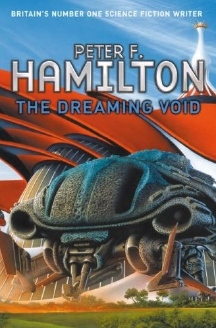 |
 Peter F. Hamilton
Peter F. Hamilton
The Dreaming Void
Reviewed by: Rick Kleffel © 2007
Pan Macmillan
UK First Edition Hardcover
ISBN 978-1-4050-8880-0
652 Pages; £17.99
Publication Date: 08-07-2007
Date Reviewed: 08-07-2007
Index:
Science Fiction
Most writers have something they do particularly well, something that brings their readers back to each new novel. This is not to say that readers shall always find what they are looking for, nor should they. If a writer relies too heavily on a specific tool, it loses its lustre. But if that fillip appears too infrequently, readers can feel cheated. It's never easy to get the balance right.
Peter F. Hamilton is best when he's working on a galactic canvas. Give Hamilton a universe, and he'll fill it up with complicated, technically advanced cultures, unusual aliens and labyrinthine conflicts. But what really shines in a Peter F. Hamilton novel are the planetary extraction scenes. It's his strong suit to put his characters in peril and then run them through a menacing maze of angry, heavily-armed locals on their way up and out. Hamilton's set-pieces are always a highlight in his novels, and 'The Dreaming Void' is no exception. He plays to his strong suit in his latest novel, the first in an inevitable trilogy set in the Commonwealth Universe of 'Pandora's Star' and 'Judas Unchained', some 1500 years after the events in those novels. You'll get your planetary extraction scenes, and they'll be every bit as exciting as you could hope. But there's more going on than just action in 'The Dreaming Void'. Hamilton effectively ups the ante of his usual space opera, complicating matters most entertainingly by introducing some no-longer new ideas and playing them to his strong suit.
The future in 'The Dreaming Void' is really rather rosy. The Commonwealth is strong, peace in general reigns throughout. A variety of aliens and humans, having defeated the Starflyer, have created a working model galactic society that is quite cleverly complicated by a variety of Singularities, both alien and human. In the years since the Starflyer War, much of humanity has taken itself beyond the realm of the physical, what Hamilton calls "the inward migration". But these post-humans are not so united as one might infer from the term "singularity". They're much more of a multiplicity, a gaggle of squabbling factions vying for power and trying to enact a variety of agendas. Hamilton's spin on the singularity is really interesting and quite entertaining. He's not trying to re-invent the wheel, but instead giving it a style-up and polish job that is a blast to read. He creates a variety of fascinating conflicts and agendas, with characters of varying morals and abilities to carry out those conflicts. It's a great way for this writer to expand his palette and yet stay true to his galaxy-spanning strengths. Humanity may ascend, but we never seem to grow up. But on the surface, the Commonwealth is relatively stable and secure.
Never underestimate the power of religion to destabilize matters. At the center of the galaxy is the Dreaming Void, a sort of artificial black hole that may hold paradise within its walls. The problem is that in order to support this paradise, it's slowly consuming the galaxy. When a human named Inigo begins dreaming of what lays within the Void, the word spreads. Soon he's gone from dreamer to prophet, and as the novel begins, millions of his followers are hoping to embark on a Pilgrimage into the Void. The problem is, most aliens and humans believe that when the pilgrims drive their starships into the Void it will trigger a catastrophic expansion. The pilgrims may or may not find heaven, but everyone else gets sucked into a black hole. All that carefully-honed peace will certainly follow.
This is where the action kicks in, early and often. Suffice it to say that the sort of set-pieces that one remembers long after having finished a Hamilton novel are here in plentitude, executed with skill, grace and verve. Hamilton's cast of characters offers enjoyable returns from the first two novels and equally enjoyable new creations. He manages to create a character whose dreams are a Peter F. Hamilton planetary romance, and a damn good one. In any effort of this size, there can be missteps. Hamilton indulges his inclination for bestseller-level sex in an imaginative environment, to be sure, but those scenes tend to ground matters a little too much. And while the pacing is always brisk, readers may find themselves experiencing galactic whiplash as they jump from one side of the Milky Way to the other at a speed considerably faster than light. But let your reading mind lead and your all-too-human brain will quite willingly follow.
'The Dreaming Void' features Peter F. Hamilton's best bits, and then ups the ante by showing off his some new skills, as Hamilton constructs a number of on-planet set pieces that are just as engaging as his stop'n'drop rescue missions. Moreover, he once again takes up the slightly-supernatural slant that made the Night's Dawn books so enjoyable. We can be sure that this will all get info-dumpified somewhere down the line, but some scenes make one recall that Hamilton's first sale was the to 1980's slick-horror magazine from the UK, Fear. If Hamilton wanted to wallow, he could clearly give the Stephen Kings of this world a run for their money or if nought else, the readers of such literature a good deal for theirs. But we're happy to see Hamilton strutting through space and setting up a conflict that looks set to take no prisoners and spawn lots of bodies, human, post-human, and alien. I'm inclined to watch it all blow up and let Hamilton sort 'em out.
|
 |
